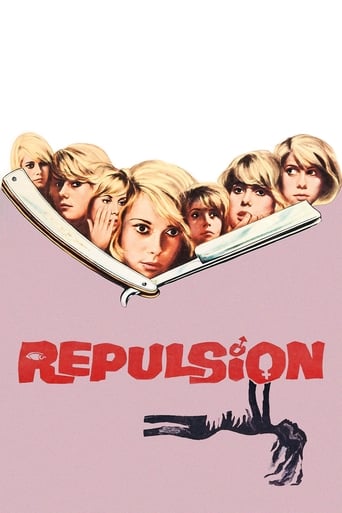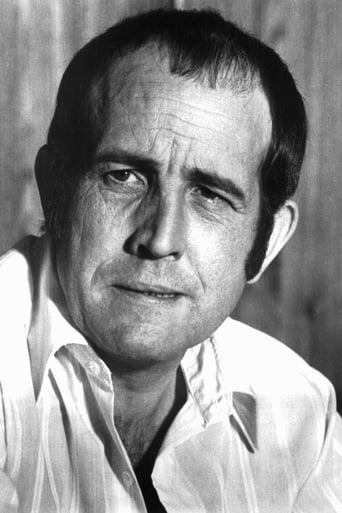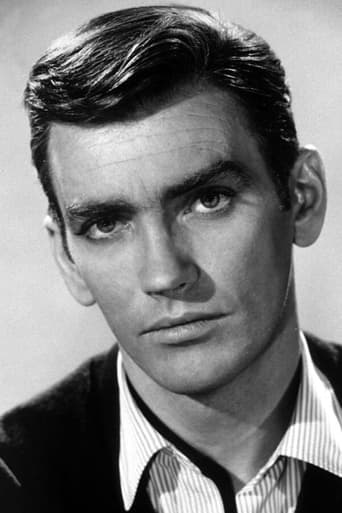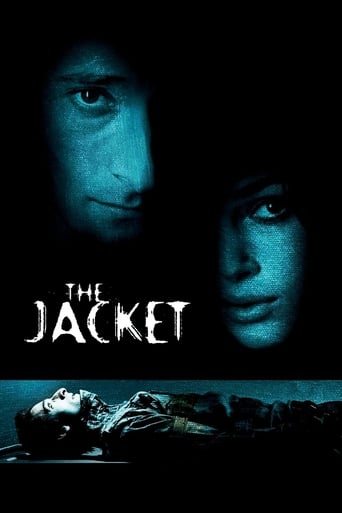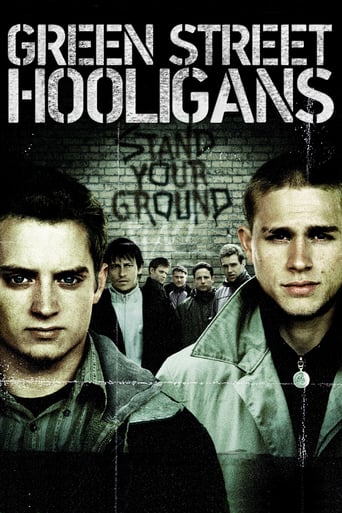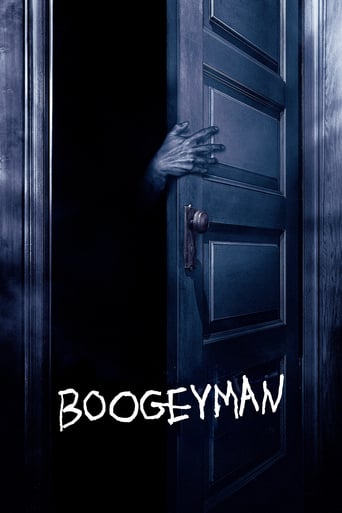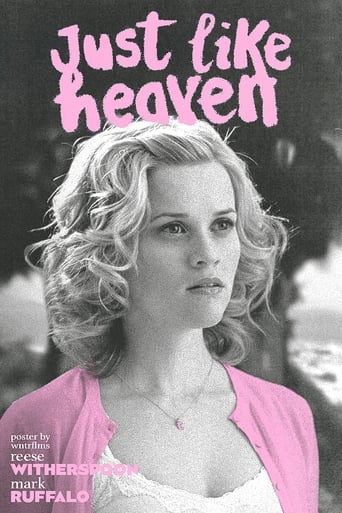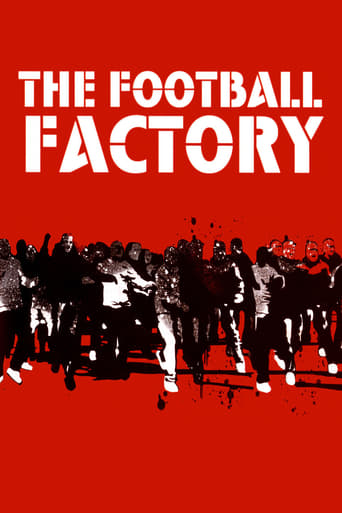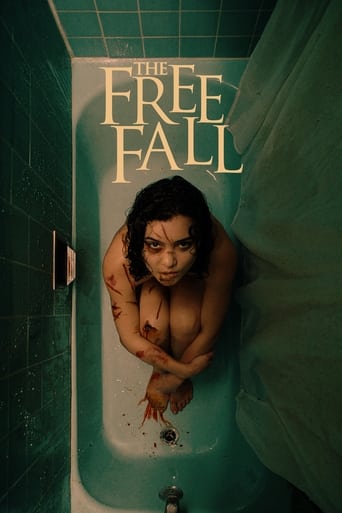Repulsion (1965)
Beautiful young manicurist Carole suffers from androphobia (the pathological fear of interaction with men). When her sister and roommate, Helen, leaves their London flat to go on an Italian holiday with her married boyfriend, Carole withdraws into her apartment. She begins to experience frightful hallucinations, her fear gradually mutating into madness.
Watch Trailer
Free Trial Channels
Cast


Similar titles
Reviews
Best movie ever!
This story has more twists and turns than a second-rate soap opera.
Great story, amazing characters, superb action, enthralling cinematography. Yes, this is something I am glad I spent money on.
It is both painfully honest and laugh-out-loud funny at the same time.
Years ago ( '70s) I saw this movie with some friends at the cinema. I was strongly impressed with a sense of awe (== terror). But there was no VHS or DVD so I put it in a drawer of my memory. Now I am retired and sometimes go back in time. Happily this movie was on DVD so I bought it. When you see it again after so many years "the penny finally dropped".I don't know much about Polanski (except from Wikipedia), but I think that he is a "gifted by nature".When you try to circumscribe (no! not geometrical, but Aristotelian) the main character, a woman, you soon find yourself immersed in what Wittgenstein called "the witchery of language". She appears not to be sensitive (a hot item these days) but sensuous (today this word is undefined!) so I use sensible in the original sense. This is not erotic but emotional (does this still exist??). And as she is very sensible she is apt to here environment. And I think that is just what Polanski does, addressing you (the audience)??? I think many people identify with here environment and expel here as "mad". But I think that if Polanski should have had "bad manners" he should have called this movie "Mirror".Enjoy,J.P. (Jan) Clifford
As I have written in other reviews, I'm generally not a fan of psychological horror because as a genre it moves too slow. This movie is no exception. I had seen it years ago and remembered that I didn't care for it much, but wanted to take another look-see so I rented it from the local library. I didn't like it in many ways this time around either. The story moves mind numbingly slow with much of the film having no dialog - the watcher is just taken along for the ride when Carol, left to her own devices by her sister, gradually starts losing her mind and ultimately becomes completely unhinged. REPULSION picks up towards the end, but getting there was excruciating for me. I had some difficulty connecting with the lead - watching her lose it wasn't pleasant, but her personality was so incredibly reserved and lifeless from the beginning of the film that I really didn't care about her over the long haul. I'm sure portraying her that way was intentional and I'm still somewhat perplexed regarding why that decision was made. I am aware that I am in the minority regarding Catherine Deneuve's depiction of Carol and that many rave reviews were written about her role in this movie. I also found that I had more questions than answers once it ended, maybe as intended, regarding the lead's familial relationships. What happened to cause a beautiful woman to be so fearful and repressed when it came to men and sexual relationships? The answer is hinted at in the last frames, but is never completely disclosed. In addition, I was a bit confused about the lead's sister - how much did she know about Carol's mental state? Did she care?All of that being said, there are some exceptional things about this film from a technical standpoint - the use of light and shadows is magnificent, drawing the viewer in to Carol's demented world and at times, using close ups to make a statement or to have the viewer look at something specific in the frame. The camera work is amazing. In those regards, REPULSION absolutely stands out. Anyone who has an interest in making a black and white film should take a look at this one if for no other reason than this. The soundtrack is also worth noting, and the symbolism and sound effects throughout the film are quite interesting. The ticking of the clock, the cracking walls, the apartment that ends up in total disarray, etc. are all indicative of Carol's mental state. The hallucinations she has are quite surreal and very well done.If you like psychological horror with minimal graphic violence, this film is considered to be a masterpiece by many. In addition, if you want to watch incredible use of light and shadow and enjoy your movies artful and symbolic, this one is a must-see. However, If you like horror films that move along at a fairly quick pace, this one will likely bore you to death.
Repulsion is a very slow movie—probably too slow for many viewers. It's also far from what I would call a cheery experience, charting a sexually repressed young woman's descent into madness and murder. It's down to the sheer brilliance of Roman Polanski's direction and star Catherine Deneuve's powerful central performance that the film proves riveting throughout, even when there's (seemingly) very little happening on screen.The movie starts off like a typical '60s kitchen sink drama, with sulky Belgian beautician Carol (Deneuve) struggling to focus at work and trying to ignore the advances of interested males. At first, Carol merely seems mopey, but things gradually start to get weird: her behaviour towards her sister's boyfriend Michael (Ian Hendry) is unusually hostile, hopeful beau Colin is completely blanked, while a stolen kiss from the young man makes her feel violently ill. But it is when her sister Helen (Yvonne Furneaux) leaves with Michael for a holiday in Italy that Carol really loses it: left on her own, her psychosis rapidly worsens, and she begins to hallucinate, cracks appearing in the apartment walls and strange men attacking her in her room at night.When Colin visits the apartment to see why the phone rings but is never answered, Carol lumps him over the head with a candlestick and dumps his body in the bath. Later, the landlord (Patrick Wymark) also meets a sticky end after he tries to take advantage of the mentally unbalanced young woman, a few slashes with a cut-throat razor putting an end to his lecherous ways. Eventually, Helen and Michael return home where they find a scene of unimaginable horror, with Carol catatonic in the bedroom.While not a particularly pleasant viewing experience, Repulsion has to be admired as a work of art, as an intense character study, and as a master-class in movie making, every frame, every sound, every image carefully considered. Carol's misery and loneliness is contrasted by the cheerful laughing coming from a nearby school and the lively music from a trio of street entertainers, and Polanski heightens the feeling of unease with twisty-turning camera-work and excellent use of light and shade, turning an ordinary apartment into a claustrophobic prison. Also adding to the overall unsettling effect is Chico Hamilton's score, which begins light and jazzy but becomes more discordant as the film progresses.Certainly not a film that I'll be visiting again in a hurry (it's way too depressing for that), but one that any serious cineaste should ensure that they have seen at least the once.
Carol Ledoux is a young Belgian manicurist living in a flat in London with her older sister Helen and Helen's boyfriend Michael. (I note that some reviewers have tried to alter the two women's names to the more authentically Francophone "Carole" and "Helene", but "Carol" and "Helen" are the spellings which we see in the credits and written down in the film itself). The film tells how Carol kills two men, a young admirer named Colin and Helen's sexually predatory landlord. The title "Repulsion" refers to the repulsion Carol feels towards human sexuality, something shown by her reaction to the noise of Helen and Michael's love-making, a reaction that is far closer to disgust than to embarrassment or annoyance. Carol is obviously mentally disturbed, something shown by her demeanour, walking around in a seemingly catatonic state and hardly ever speaking to anyone.This was Roman Polanski's first English-language film and his second feature film following the Polish-language "Knife in the Water" from 1962. It has generally enjoyed a high reputation among Polanski devotees, but it has never been a film which I have been able to warm to, even though, technically, it is a good one. It is a psychological horror film influenced by the work of Alfred Hitchcock, especially "Psycho", and the use of black-and-white photography at a time when colour was becoming the norm may reflect this influence. (The use of a single-word title may also have been homage to Hitchcock; a lot of his films ("Saboteur", "Suspicion", "Notorious", etc.) only have one word in the title. Polanski and his cinematographer Gilbert Taylor are able to create a powerful sense of isolation and claustrophobia and there is a particularly frightening dream sequence.The problem with the film is that there is no character with whom the audience can identify or sympathise. In "Psycho"- a brilliant piece of film-making- Hitchcock is able to make us sympathise not only with his heroine, Marion Crane, and the other murder victims but also, to some extent, with their killer, Norman Bates, who is the victim of his own disturbed mind. Polanski is not able to pull off the same trick. Carol may be mentally ill, but that does not mean that the two killings can simply be seen as the acts of a deranged mind. Indeed, they might even be seen as justifiable homicide in self-defence.This is particularly true of the landlord, whom Carol kills while he is trying to rape her. Colin may not be a rapist, but there is nevertheless something creepy about him. He becomes obsessed with Carol, whom he hardly knows, and when she rebuffs his advances he breaks into the flat to protest his adoration for her, obviously frightening her severely. We cannot therefore really sympathise with Carol's victims, the one a would-be rapist, the other an obsessive creep.So can we sympathise with Carol herself? We certainly could if we understood the cause of her psychological traumas, as we do with Norman Bates, but we don't. It has been suggested that she may have been sexually abused as a child by her father or another male relative, but there is no direct mention of this in the film itself. The only piece of evidence comes in the very last shot of the film, which shows an old family photograph including Carol as a child, looking at an adult male with what has been described as a "look of loathing". On the other hand, it might be a look of "Oh God, Daddy's making me pose for one of these stupid family photos, and I just don't want to!" Catherine Deneuve's performance is, again, a technically good one, at least as far as Carol's outward demeanour is concerned, but we never get much sense of her inner life- or even that she actually has an inner life. Carol seems so dead to the world that we never understand why Colin has fallen for her so heavily, even though Deneuve was of course strikingly attractive. "Repulsion" may be a film which engages the head, but it is never going to appeal to the heart. 5/10

